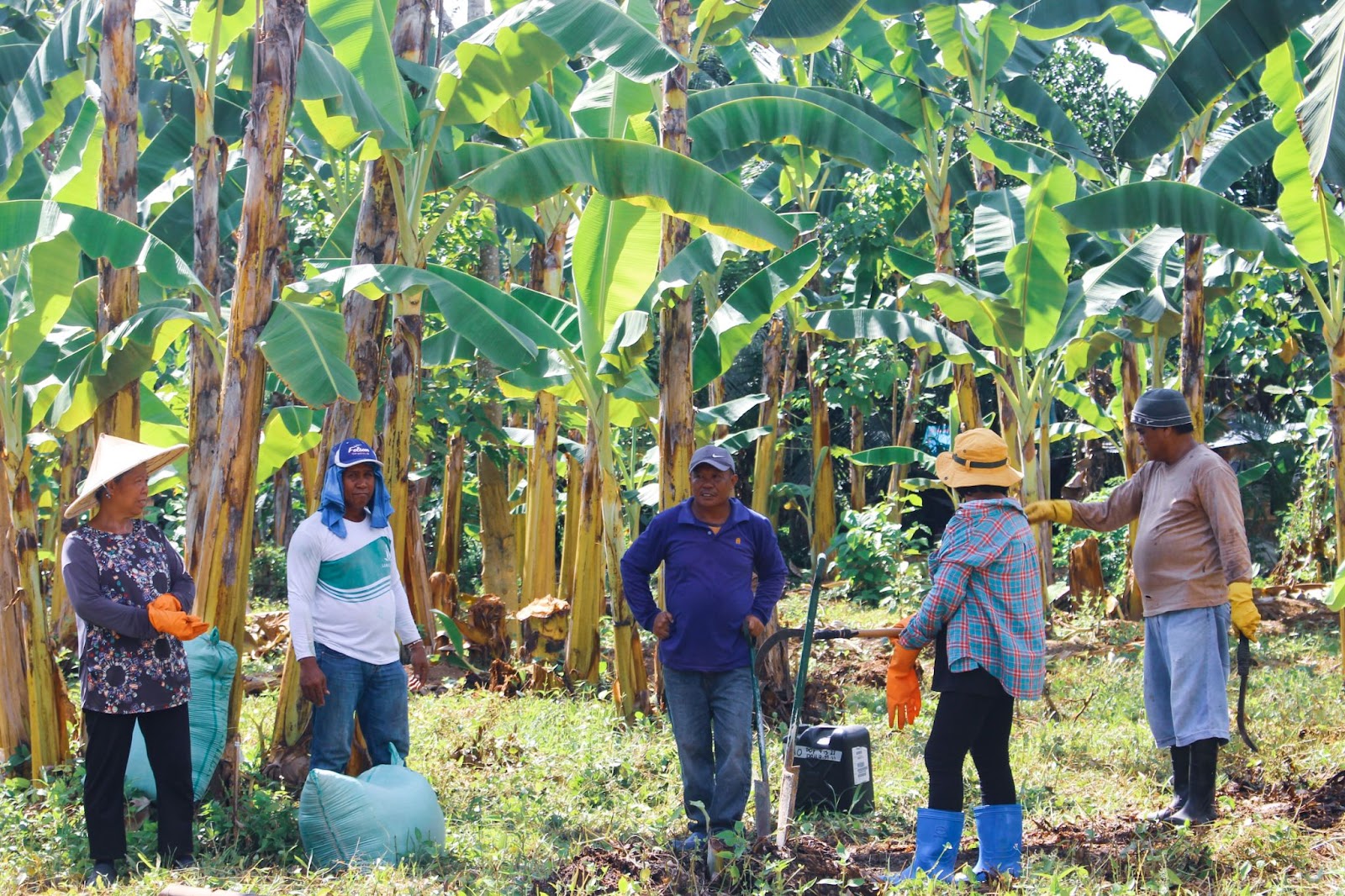ECONOMIC RIGHTS
A Sustainable Future through Organic Farming

by Elijah Macaspac
Amidst the wearying economic conditions, and worsening impacts of climate change, the elderly farmers in Mawab, Davao de Oro cultivate a sustainable future through organic banana farming.
Building a sustainable future means meeting the needs of the present without compromising the ability of future generations to satisfy their own needs. The members of the Nueva Visayas Agrarian Reform Cooperative (NUVIARCO) have been doing so by transitioning from practicing conventional farming to developing an organic agricultural enterprise using sustainable principles and practices.
NUVIARCO is currently undergoing an organic farming project called Project GROW. The said project was developed by the Initiatives for Dialogue and Empowerment through Alternative Legal Services (IDEALS) Inc., with the support of Voice. With the assistance of the Foundation for Agrarian Reform Cooperatives in Mindanao Inc. (FARMCOOP), the project aims to develop the NUVIARCO members’ land to be suitable for production of organic bananas. Aside from a diversified organic plantation using cavendish bananas as the main crop, certain areas will also be used for communal buildings, farm facilities and installation, and other physical development. Through the project, NUVIARCO also aims to be able to establish its own consolidated marketing for their organic cavendish banana plantation. The project’s goal is to give NUVIARCO members the opportunity to have a sustainable livelihood.
Deogines Basbano, Jr., also known as Cadoy, is a 60-year old banana farmer who is transitioning to organic farming thanks to the training provided by NUVIARCO through Project GROW. He is grateful for the fresh insights he has gained, after nearly three decades of farming.
“I learned how to make bio fertilizer, and other technical techniques to grow bananas,” he shared. “It’s better for our health and it’s also better because we can sell it at a higher price in the market.”
Road to Environmental Sustainability

Organically farmed produce, such as bananas, is appealing to an increasing number of consumers concerned with environmental sustainability. A study by the Food and Agriculture Organization (FAO) of the United Nations revealed that there has been an increasing demand for organic bananas worldwide. Between 2008 and 2015, the area dedicated to growing organic bananas globally increased by 18%.
http://www.fao.org/world-banana-forum/projects/good-practices/organic-certification/en
The Philippines is one of the top countries exporting bananas. According to FAO, the Philippines is projected to secure its position as the world’s second largest banana exporter by 2029.
Using organic farming practices, farmers significantly contribute to the soil regeneration and reduction of toxic chemicals and substances into the land in their area. These also enable farmers to build a rich, diverse, healthy soil ecosystem that can better retain and cycle water, and nutrients, along with the ability to better resist and recover from stresses like flooding or aggressive tillage.
Despite these benefits, NUVIARCO is still aware of the obstacles they are facing. Jerry Sabay, NUVIARCO chairperson, admitted that there are members who are hesitant of the proposed changes in farming practices.
“One of the challenges we have to deal with are the doubts of other members,’ he shared. “Organic practices are new to them and some farmers have yet to fully understand the long but rewarding process of organic farming.”
However, after months of training, seminars, and implementation, doubts are slowly clearing as they start to actually see results.
“Appreciation for farming should start at home. Parents should encourage their children to learn, not just about farming, but also about agriculture so they can also learn about environment conservation,” Jerry stated.
Cadoy also emphasized the need to add organic farming in schools as it will help young people develop an understanding about how food is grown and how farmers provide it.
“There is still a lack of education about organic farming in the country.” Cadoy said. “The government and private sectors need to work together to support farmers.”
Empowering the Farmers
There is an igniting community spirit among the members of NUVIARCO given the access to resources, training, and economic benefits that are given to them. Through the organic banana plantation, farming families meet their basic needs such as sufficient meals and education for their children.
Along with that, NUVIARCO is also continuously taking steps in reviving the Philippines as one of the major suppliers of organic bananas worldwide.
According to Cadoy, other areas in Mawab are starting to follow their example in organic farming after learning that organic bananas are more expensive than commercial ones.
http://www.fao.org/world-banana-forum/projects/good-practices/organic-certification/en
He said, “Everything in the community will improve if we practice organic farming, and others are more curious now of what we do. We can further encourage them to join next time because they see us getting buyers.”
Looking Forward
Looking towards the future, NUVIARCO hopes to get their organic farming certification, which will be a rigorous procedure wherein their land’s compliance with the environmental and social standards will be evaluated.
NUVIARCO now has their eyes on the prize as they prepare for the start of the certification process which will begin by mid-2023. Once they achieve this, their crops will be certified as fully organic bananas in the market and they can sell it at higher prices.
Community development for our farmers is an important piece of the puzzle of how the country can move towards a sustainable future.
In order to attain this, the agricultural sector needs to make significant improvements in the efficiency of resource use, environmental conservation, and system resilience; but they can’t do it alone. It also calls for a governance that revisits agricultural policies to promote local markets.
Though the road to their goal may seem rough and long, Cadoy keeps in his heart the principle he always shares with his son. A reminder of the importance of what they do. He said, “whether you become a teacher, engineer or lawyer, no matter what profession you attain, when you grow old, you always find your way back to farming.” ###
